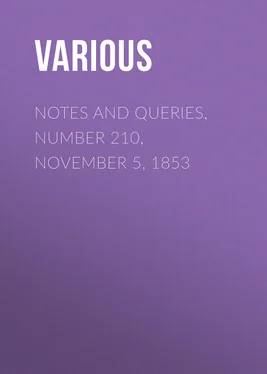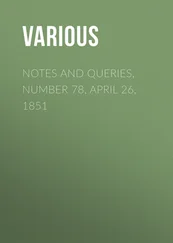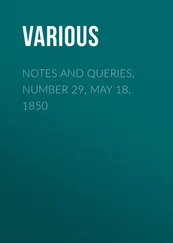Various - Notes and Queries, Number 210, November 5, 1853
Здесь есть возможность читать онлайн «Various - Notes and Queries, Number 210, November 5, 1853» — ознакомительный отрывок электронной книги совершенно бесплатно, а после прочтения отрывка купить полную версию. В некоторых случаях можно слушать аудио, скачать через торрент в формате fb2 и присутствует краткое содержание. Жанр: foreign_antique, periodic, foreign_edu, на английском языке. Описание произведения, (предисловие) а так же отзывы посетителей доступны на портале библиотеки ЛибКат.
- Название:Notes and Queries, Number 210, November 5, 1853
- Автор:
- Жанр:
- Год:неизвестен
- ISBN:нет данных
- Рейтинг книги:4 / 5. Голосов: 1
-
Избранное:Добавить в избранное
- Отзывы:
-
Ваша оценка:
- 80
- 1
- 2
- 3
- 4
- 5
Notes and Queries, Number 210, November 5, 1853: краткое содержание, описание и аннотация
Предлагаем к чтению аннотацию, описание, краткое содержание или предисловие (зависит от того, что написал сам автор книги «Notes and Queries, Number 210, November 5, 1853»). Если вы не нашли необходимую информацию о книге — напишите в комментариях, мы постараемся отыскать её.
Notes and Queries, Number 210, November 5, 1853 — читать онлайн ознакомительный отрывок
Ниже представлен текст книги, разбитый по страницам. Система сохранения места последней прочитанной страницы, позволяет с удобством читать онлайн бесплатно книгу «Notes and Queries, Number 210, November 5, 1853», без необходимости каждый раз заново искать на чём Вы остановились. Поставьте закладку, и сможете в любой момент перейти на страницу, на которой закончили чтение.
Интервал:
Закладка:
This codicil immediately became the subject of remark, and the terms of it seem to have been understood as they would be now. Flamsteed, writing in July, 1715 (Halifax died in May), says:
"If common fame be true, he died worth 150,000 l. ; out of which he gave Mrs. Barton, Sir I. Newton's niece, for her excellent conversation [the Italics are Baily's, the original, I suppose, underlined], a curious house, 5000 l. with lands, jewels, plate, money, and household furniture, to the value of 20,000 l. or more."
I pay no attention to the statement that ( Biogr. Brit. , Montague, note BB.) Lord Halifax was disappointed in a second marriage. It amounts only to this, that Lord Shaftsbury, having a certain lady in his heart and in his eye, was afraid he had a rival, and described the person talked of in terms which make it pretty certain that Halifax was intended. But it by no means follows that because a certain person is "talked of" for a lady, and a lover put in fear by the rumour, the person is really a rival: and not even a biographer would have shown himself so unfit for a novelist as to have drawn such a conclusion, unless he had been biassed by the wish to show that Halifax was attached to another than Mrs. Barton.
It must of course be supposed that the introduction of Montague to Newton's niece was a consequence of his acquaintance with Newton, and took place in or near 1696, when Newton came to London, where his niece soon began to reside with him. And since, in 1706, the connexion, whatever it was, had been of long standing, we may infer that it had probably commenced in 1700. The case is then as follows. Montague received into his house, as "superintendent of his domestic affairs" after the death of his wife, the niece of his old and revered friend Newton, a conspicuous officer of the crown, a member of Parliament, and otherwise one of the most famous men living. This niece had been partly educated by Newton; she had lived in his house; we know of no other protector that she could have had, in London; and the supposition that she left any roof except Newton's to take shelter under that of Montague, would be purely gratuitous. She was unmarried, beautiful, and gay; and probably not so much as, certainly not much more then, twenty years old. A handsome annuity was bought for her in Newton's name, and held in trust by Halifax: if it had been bought by Newton , Conduitt would have mentioned it in his list of the benefactions which Newton's relatives received from him, especially after the publicity which it had obtained from Halifax's will. That she did not tenant the housekeeper's room while the friends of Halifax were round his table, may be inferred from the epigrams, poor as they are, which were made in her honour as a celebrated beauty and wit, in a collection of verses (reprinted in Dryden's Miscellanies ) on the best known toasts of the day. Halifax bequeathed her a provision which might have suited his widow, in terms which must have been intended to show that she had been either his wife or his mistress; while in the same document he brought prominently forward his respect for Newton, the fact of her being Newton's niece, and the annuity which he had bought for her in Newton's name. An uncontradicted paragraph in the life of Halifax, published immediately after the will, and evidently not intended to bring forward any fact not perfectly well known, records her residence in the house of that nobleman and the consequent rumours concerning her character, affirms that she was a virtuous woman, and refers to the will to prove it: though the will denies it in the plainest English, on any supposition except that of a private marriage. Finally, the lady married a respectable man after the death of Lord Halifax, and lived with him in the house of her illustrious uncle.
That she was either the wife or the mistress of Halifax, I take to be established; it is the natural conclusion from the facts above stated, all made public during her life, all left uncontradicted by herself, by her husband, by her daughter, by Lord Lymington her son-in-law, and by the uncle who had stood to her in the place of a father. It is impossible that Newton could have been ignorant that his niece was living in Montague's house, enjoyed an annuity bought in his own name, and was regarded by the world as the mistress of his friend and political patron. The language of the codicil shows that, be the nature of the connexion what it might, Halifax meant to tell the world that it might be proclaimed in all its relation to the name of Newton. To those who cannot, under all the circumstances, believe the connexion to have been what is called platonic, the probability that there was a private marriage is precisely the probability that Newton would not have sanctioned the dishonour of his own niece: and even if the connexion were only that of friendship, Newton must have sanctioned the appearance and the forms of a dishonourable intimacy: the co-habitation, the settlement, and the defiance of opinion. Now there is no reason to suppose of Newton that he would be a party to either proceeding, which would not apply as well to any man then alive: to Locke, for instance. Looking at the morals of the day, we are by no means justified in throwing off at once, with disgust, the bare idea of the possibility of a distinguished philosopher consenting to an illicit intercourse between his friend and his niece: we are bound, in discussing probabilities, to distinguish 1850 from 1700. But, even putting out of view the purity of Newton's private life, and of the lives of his most intimate friends, there is that in the weaker part of his character which is of itself almost conclusive. Right or wrong, Newton never faced opinion. As soon as he found that publication involved opposition, from that time forward he published only with the utmost reluctance, and under the strongest persuasions; except when, as in the case of some of his theological writings, he confided the manuscript to a friend, to be anonymously published abroad. The Principia was extorted from him by the Royal Society; the first publication on fluxions was under the name of Wallis; the Optics were delayed until the death of Hooke; the first appearance against Leibnitz was anonymous; the second originated in a hint from the King. This morbid fear, which is often represented as modesty, would have made him, had he acted a part with regard to his niece which he could not avow, conduct it with the utmost reserve. The philosopher who would have let the theory of gravitation die in silence rather than encounter the opposition which a discovery almost always creates, would not have allowed his name to be connected with the annuity which was the price of his niece's honour, or which carried all the appearance of it, even supposing him base enough to have connived at the purchase. And in such a case, Halifax would have taken care to respect the secrecy which he would have known to have been essential to Newton's comfort: he would not have published to the world that his mistress was Newton's niece, and that Newton was a party to a settlement upon her. There seems to me, about the codicil as it stands, a declaration that the connexion with Newton's niece was such as, if people knew all, Newton might have sanctioned. And the supposition of a private marriage, generally understood among the friends of the parties, seems to me to make all the circumstances take an air of likelihood which no other hypothesis will give them: and this is all my conclusion.
If there were a marriage, the most probable reason for the concealment was, that it was contracted at a time when the birth and station of Mrs. Barton would have rendered her production at court as the wife of Montague an impediment to his career. He was raised to the peerage in 1700, and as the connexion was of long standing in 1706, it may well be supposed that it commenced at the time when (in his own opinion at least) his prospects of such elevation might have been compromised by a decided misalliance. The lower the tone of morals, the greater the ridicule which attaches to unequal marriages . Montague, though of noble family, was the younger son of a younger son, and not rich: it was common among the Tories to sneer at him as a parvenu . He had made his first appearance in the great world as the husband of a countess-dowager, and it may be that the parvenu was weak enough to shrink from producing, as his second wife, a woman of very much lower rank, the granddaughter of a country clergyman, and the daughter of a man of no pretension to station. That Mr. Macaulay has not underrated the position of the country clergy, is known to all who have dipped into the writings of the seventeenth century. It is not, however, necessary to explain why the supposed marriage should have been private. As the world is constituted, no rules of inference can be laid down in reference to the irregular relations of the sexes.
Читать дальшеИнтервал:
Закладка:
Похожие книги на «Notes and Queries, Number 210, November 5, 1853»
Представляем Вашему вниманию похожие книги на «Notes and Queries, Number 210, November 5, 1853» списком для выбора. Мы отобрали схожую по названию и смыслу литературу в надежде предоставить читателям больше вариантов отыскать новые, интересные, ещё непрочитанные произведения.
Обсуждение, отзывы о книге «Notes and Queries, Number 210, November 5, 1853» и просто собственные мнения читателей. Оставьте ваши комментарии, напишите, что Вы думаете о произведении, его смысле или главных героях. Укажите что конкретно понравилось, а что нет, и почему Вы так считаете.












